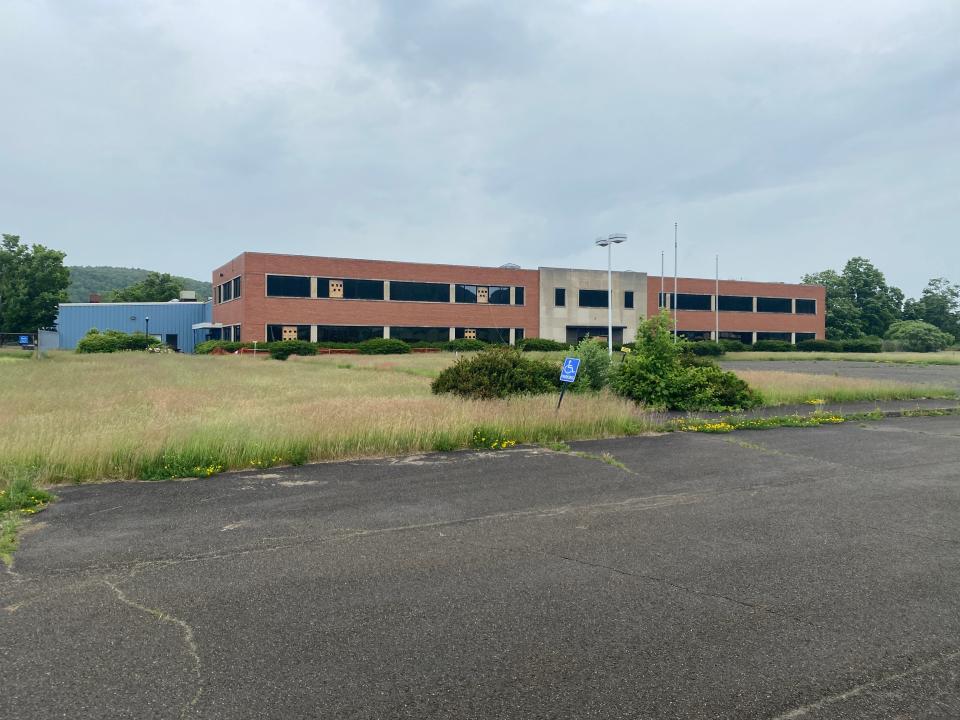An ongoing environmental cleanup at the former Philips Lighting Company off State Road 54 in Bath is expected to be completed sometime this fall, according to the state Department of Environmental Conservation.
Philips North America is performing the cleanup activities with oversight by the DEC. The plant, which previously manufactured light bulbs, closed in early 2014.
The former 335,000 square-foot Philips Lighting facility was razed in 2021. Work resumed in April to remove the remaining concrete slab and parking lot, allowing for removal of contaminated soil underneath.
“They are in the process of pulling out the cement slabs where the building stood and a bunch of pavement because there is additional cleanup work that needs to be done,” said Jamie Johnson, executive director of the Steuben County IDA. “The hope is this is the final phase of the cleanup.”
What’s next for Philips Lighting property?
The latest environmental work is expected to continue through October, said the DEC.
Johnson said once the work is finished, Philips North America hopes to get the certificate of completion to advance the sale and redevelopment of the property. The property may only be eligible for industrial uses in the future, depending on environmental factors.
“Any restriction placed on the property will be on the certificate of completion,” Johnson said. “I believe they are cleaning it back to an industrial standard, which would preclude things like housing, childcare and other residential types of developments. But that will all be outlined in the certificate of completion.”
Steuben County Manager Jack Wheeler said the remediation and demolition of the former Philips Lighting plant may lead to future development at the 75-acre site, which could boost the county’s employment and tax base.

Environmental cleanup goals
According to the DEC, the goal of the cleanup actions for the site is to protect public health and the environment.
Components of the work happening in 2024 include:
-
addressing the removal of the former Acid Neutralization System and related piping as well as the removal of surficial soils which have been identified to be impacted with mercury and polycyclic aromatic hydrocarbons.
-
Removing the concrete slab for the former building, asphalt pavement, and various subgrade structures; surficial soil contamination; and building a clean soil cap across over 140,000 square feet of the site.
-
Surface soil with exceedances of PCBs, PAHs, and metals will be addressed with at least one foot of clean soil cover and managed in place.
-
Surface soil with TCE and Cadmium exceedances will be removed from the site and replaced with clean fill.
-
Importing clean soil for use as backfill and restoring the site cover by placement of a 1-foot clean soil cover.
Following cleanup activities, Philips North America will prepare Construction Completion Reports and submit them to DEC. The report will describe the cleanup activities completed and certify that cleanup requirements have been achieved or will be achieved.
Following completion of the remedial work, Philips will submit a Remedial Investigation Report to define the nature and extent of the remaining contamination across the site.
More: Summer events in Corning: See what’s happening at CMoG, Rockwell Museum, Gaffer District
Bath site has a long manufacturing history
The former Philips Lighting site’s industrial history dates to the early 1950s when the Westinghouse Electric Corporation built the facility and began manufacturing vacuum and receiver tubes.
Westinghouse was bought by Philips Electronics North America in 1984, according to the DEC. Later site operations included the manufacturing of lamps, filament wire material, halogen lighting, and coating powders.
Preliminary site investigations were conducted in 2012 to prepare for the plant’s decommissioning and subsequent demolition. Philips North America applied to enter DEC’s Brownfield Cleanup Program in 2013 and various cleanup activities have been undertaken over the last decade.
This article originally appeared on The Leader: Environmental work resumes at Philips Lighting in Bath. What’s next?
Source Agencies


